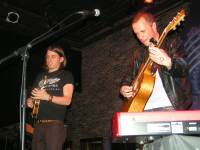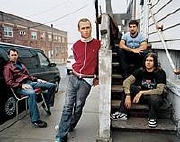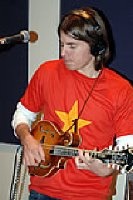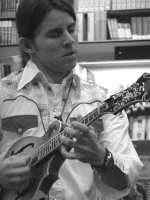|
Beau Stapleton |
|
|
|
A pop band comprised of a fiddle, mandolin, upright bass, and acoustic guitar? That may seem strange, but somehow Blue Merle is making it work for them. After scoring opening slots for the likes of Marc Broussard, Counting Crows, and Glen Phillips, as well as getting airplay in many major cities like Chicago, San Francisco, and their hometown of Nashville, Blue Merle is on the verge of major success. Before a recent show, Beau Stapleton, the bandís mandolin player, took time to sit down with Way Cool Music to discuss the band, their unique instrumentation, and the best way to become a rock star. |
|
|
Way Cool: |
Tell us a little bit about your background.
|
|
|
Beau Stapleton: |
I grew up in the Reno/Tahoe area, went to high school out in California, and went to college in Colorado at Colorado College where I majored in geology. While I was in school, I started to play the mandolin and dedicate myself to gigging out and studying music. By the end of college, I was pretty much playing full-time. After school, I just followed that path and it led me here. |
|
|
WC: |
What other instruments do you play other than mandolin and guitar? |
BS: |
I started off with the guitar, which I still play ever so often on and off stage. Other than that, I play a little fiddle. Iím not technically very competent, but I really enjoy playing old-time tunes. I have recently picked up an electric mandolin, an instrument that was built for me by Lukeís father, and a 1927 martin tenor guitar. Both of those instruments made it onto the album and are a big part of where I am at musically right now.
|
|
 |
|
WC: |
So you and Luke met through his mom? |
|
|
BS: |
First off, Vermont is a really small music community and his mom is a music nut! I was playing mandolin in a more traditional bluegrass band at this bluegrass festival. Luke, as well as myself, both share a love of Americana and more traditional roots music and his mom knew that. So, his mom sees this young guy playing mandolin at a bluegrass festival up in Vermont. She runs up to me after the set, sheís very high energy, and says, ďOh my God! You gotta meet my son, you gotta meet my son. He just moved down to Nashville and heís really doing well down there. Heís trying to put a band together. Youíre gonna love him. You totally gotta meet him. Can I give him one of your CDs? I need one of your CDs for my son.Ē I was like, ďOK.Ē I gave her one of the CDs and she sent it down to Luke in Nashville. It wasnít until about six months later when a different friend introduced us again that we put it all together. |
|
|
WC: |
How would you describe Blue Merleís music to someone how has never heard the band? |
|
|
BS: |
Weíve been describing the music as simply as possible, which is acoustic rock. We donít want to get too much more into labeling it. It feels like the more generic the label, the more it allows us to explore whatever we want to explore with the music. We always feel that weíre growing and exploring things musically, whether thatís jazz rhythms or bluegrass rhythms or straight ahead rock. We kinda think a good blanket term for it all is acoustic rock. |
|
|
WC: |
How does Blue Merleís music fit into the mainstream music scene given its unique instrumentation? |
| |
|
BS: |

|
|
I think that a lot of the songs, lyrically as well as melodically, are fairly accessible. One thing we try to do with the songs is to put our thoughts down in musical form, but also to create something thatís accessible and universal. We are sharing an emotional experience and making a connection with the listener and thatís an inspiring thing about being a musician.
Ultimately, we think the songs will fit into a lot of categories and will be universal. Weíre hoping that the fans of pop music and bluegrass music and whatever music will gravitate toward the nature of the songs. We do our best to accompany the lyric with a strong melody. I think that our instrumentation is different and we really put a lot of emphasis on musicianship. Hopefully we will be respected for that. Weíre hoping that in music as a whole, thereís return to a roots ideal of people actually playing their instruments. Weíd like to be a part of that. |
|
WC: |
Iím sure you get this a lot, but weíre going to say it anyway. You guys kinda sound like Coldplay. You kinda have the Counting Crows and Dave Matthews vibe. How do you respond to those comparisons? |
|
|
BS: |
I think itís really cool. A lot of people use comparisons as a way to get into a new band. How they put their head around the sound is to say, ďOh, it kinda sounds like band A meets band B.Ē We get a lot of that. We also hear a lot of people saying that we have a very refreshing sound. Those are great comparisons ultimately to get. I grew up listening to Counting Crows and really like their stuff. Coldplay is a really amazing band, I think. And Dave Matthews, we share a lot of the same instrumentation with the violin. On one level (those comparisons) are really flattering. Occasionally you get the person who says, ďTheyíre just ripping off (insert band name here)!Ē But, for the most part, people are pretty excited about that. At the same time, they say, ďYou sound like (insert band name here), but youíre also refreshing.Ē I think thatís where popular music is right now. As a musician, you have smaller contributions to the music as a whole because there are so many artists out there, so much great music, so many great songs, and so many great instrumentalists. You just take small steps and do what you want to do. You write the songs you want to write, put out the sounds you hear in your head, and wherever it lands, it lands. |
|
|
WC: |
There is a lot of buzz around the band right now. How has the buzz affected you and your life? |
|
|
BS: |
The buzz about the band has affected us most in the demands on our schedule. Media outlets, whether it be radio, in-stores, TV, or interviews, there are a lot of people who want to interview us when weíre coming through town. That adds a lot to our touring schedule. We feel really fortunate to have that, but we really have to stay on top of it. You really have to be into the lifestyle and get your sleep and stay healthy so that, when you get the opportunity to interact with someone and put the band forward, youíre 100%.
Other than that, I donít think weíve really felt a change in who we are and what we do with the added attention. Thereís definitely a great new vibe with the audience now that we have the first album out and there is song recognition. Itís very validating to hear people singing back the lyrics and see people coming out to shows who only know you through the radio or magazine article. That feels really good.
|
|
|
WC: |
How long were you a band before you were signed to Island? |
|
|
BS: |
For about two and half to three years. |
|
|
WC: |
Were you touring at that point? |
| |
|
| BS: |
We were. As a new band, itís really hard to go out and tour full-time, especially when you donít have a full-length CD and you donít have a record company to support you. Itís really hard to make ends meet, to be honest with you. We did it, though. We got our van and rented Motel 6 rooms and piled all of us into one room and did whatever needed to be done. I think Luke was on food stamps at one point. The reality of the situation is that we couldnít be out as much as we are now. Now we have a great foundation for being on the road and to put our music out there as much as possible. |
|

|
|
| |
|
WC: |
Now that youíve completed the Glen Phillips tour and have a headlining tour coming up, and who knows what else this summer, how do you have a personal life with the demands of touring? |
|
|
BS: |
Itís really hard. On the road I always make a point every day to have some personal time. Iím a morning person, which somewhat conflicts with this lifestyle, but even if it means losing a little bit of sleep, Iíll make a point of getting up early to be by myself, read, or do Yoga. I also try to take advantage of one thing that the road offers us, which is seeing the entire country. I get up early and walk around the town, or read something about the city weíre in. I find that it helps me personally stay grounded and keep everything in perspective.
Other than that, when we are on the road, the hardest thing is keeping close with family and friends. You tend to idealize the situation of being in one town, having friends and hanging out with them for a few nights. Out here I am constantly thinking about those that I love. I make it a point to stay in contact with my community back in Nashville, whether it be writing a letter or an email or giving them a phone call. You have to be more conscious of your relationships. |
|
|
WC: |
What other roles in the music industry would you like to explore? |
| |
|
| BS: |

|
|
The studio is a really exciting place and being a part of that and the rawest creative process is really exciting. Iíve been able to help out other people doing some producing. Itís so stimulating to the musical side of your brain, just being in the studio. The business side of it is fascinating. I donít know how much of it I would want to be involved with it, though. Itís so cutthroat and volatile. |
|
| |
|
WC: |
Youíve done some writing and even got second place at the Chris Austin songwriting contest at Merlefest in 2004 with Abigail (Washburn). Tell us a little bit that and working with Abby. |
|
|
BS: |
Well, Abby and I dated for seven years up until about a year ago. |
|
|
WC: |
Up until you lost the contest. |
|
|
BS: |
(Laughing) Damn! If only we had won! No, sheís great and was just signed to Nettwerk Records. She has a new album coming out in three or four months and I have a handful of co-writes on there. Playing and writing music was a big part of our relationship. We had good chemistry musically and she was new to being a writer/musician and playing. Often times, she would come up with choruses and I would jump in and finish lyrics or put chords behind her ideas. It was a collaborative effort.
I write on my own as well. Another great aspect of this band is that itís somewhat of a platform to write. Even if itís stuff that might not fit into Blue Merle, if itís an instrumental mandolin piece or something like that, Iím starting to find avenues to get that stuff out there.
Getting back to the Chris Austin songwriting contest at Merlefest, itís a great writerís event. Mindy Smith won it one year as did Gillian Welch and David Rawlings. To have our song come in second was great. We didnít really think of it as a bluegrass song because itís a really slow ballad. So it felt really good that it placed so high in the bluegrass category. The song is coming out on Abbyís new record. You should check it out at www.abigailwashburn.com. |
|
|
WC: |
Have you been in contact with your old college band? What do they think of your success? |
| |
|
BS: |

|
|
That was a band called Limberjack County. We really learned to play music together. For about two years after college, we stuck it out. It was traditional bluegrass, great roots music, with good energy to the band. But, itís a really intense lifestyle. I think the writing was there, but we knew that if we wanted to take it to the next level, it would a two to three year period of all that living on food stamps, sleeping in a single hotel room thing. There wasnít a unanimous feel for moving forward. One of the guys had a family, one wanted to pursue a job in journalism, one wanted to hike the Appalachian Trail; there are just different lifestyle priorities. I was definitely one who wanted to keep going as much as possible and I was already looking for more opportunities to play. Weíre still friends and always will be after being so tight for six years. Every time Iím playing in a town where they are at, they come out to see me and we get to hang. |
|
WC: |
Imagine a competition, a mando-off, between you and Chris Thile (Nickel Creek), who wins? |
|
|
BS: |
Chris would kick my ass! Oh man, heís so good. The technical side of his playing is just incredible, even if you go back and listen to the early recordings of his from when he was eight. I donít think I had even played an instrument at eight and he was a national champion mandolin winner. Heís great. Heís phenomenal technically. Heís a good guy too. |
|
|
WC: |
Whatís been your biggest rock star moment so far? |
|
|
BS: |
I grew up listening to a lot of Neil Young. We played Farm Aid recently and there were 25,000 people there. For the encore, they called all the bands back on stage to do the sing-along and I kinda jockeyed for position to stand next to Neil Young. I was out on stage with him and sang harmonies next to him. It was awesome. |
|
|
WC: |
If you werenít a musician, what do you think youíd be doing with your life? |
|
|
BS: |
Iíve always been following the musical path and it was never a conscious decision; one thing just led to another. At one point, I thought thatÖ I majored in geology so I thought that I would be doing something related to that. If you want me to get more technical, my focus after school was going to be ground water resource management. So, I would be doing something with that.
Also, I love houses and carpentry and I love building things and using my hands. Another goal of mine is to live and work outside the country. Thatís something that I long for and an experience I hope to someday have.
|
|
|
WC: |
Whatís the most surprising thing people donít know about you? |
|
|
BS: |
I think that Iíve done a lot of other things in my life. Iíve had a lot of different experiences. When youíre a musician, people tend to think of you in that one-dimensional way. But, there are a lot of other things that Iíve done, whether itís geology or that Iíve been really fortunate and have traveled a lot.
Itís funny, you always hear of musicians who do interesting things. Iím trying to think of a good example. Edgar Meyer loves calculus. When heís on the road and traveling, to pass the time he does calculus. You hear about people who have other careers or interests on the side. Iíve always found that intriguing about other artists. Me, Iím looking at rocks. |
|
|
WC: |
Has anyone brought you a rock to a show to study? |
|
|
BS: |
No, not yet. But I get the pun, ďYou studied geology to be a rock star.Ē I get that quite a lot. |
|
|
WC: |
Now itís time for seven questions. |
|
|
| |
|
|
|

|
|
|
What's the worst job you've ever had?
|
|
Iíll say the worst sounding job, because I really enjoyed it. I worked at a compost farm. Basically what that entails is hauling compost from town to this farm and dumping it on compost heaps. Itís big smelly piles of food, but I had chickens and stuff to take care of and farm stuff to do and I loved it! |
|
What's your favorite movie quote or song lyric?
|
|
Song lyricÖ I always loved Townes Van Zandtís, ďHer ways were free/And it seemed to me/that the sunshine walked beside her.Ē Itís so deceptively simple. Itís from Townes Van Zandtís ĎTecumseh Valley.í There are a lot of lyrics that jump out at me that at different times have meant something in my life, more so than movies. Iím not a movie person. |
|
Who would you want to star in the movie of your life?
|
|
Iím not a movie person. I donít know actorís names. I pass. |
|
What's your favorite TV theme song?
|
|
Dukes of Hazard. |
|
If you were a superhero, what would your name be?
|
|
I donít know. Geez! I have to be creative on the spot. Let me talk my way through it. Iím a superhero. Whatís my secret power? For some reason when I was a kid, I always fantasized about being invisible. So, that would be my power, to be able to disappear. I guess Iíd be Invisible Beau or InvisiBeau. |
|
What do you want to be when you grow up?
|
|
A monkey. Thatís kinda cool, to crawl around on trees. |
|
Finally, why are there so many songs about rainbows?
|
|
Kermit has had a lasting effect on a lot of artists and musicians and I think we all draw inspiration from him. |
|
|
|
|
|
To find out more information about Beau Stapleton. visit his band's website at www.bluemerle.com. |
|
|